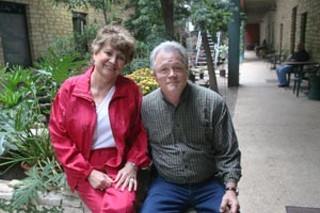From Hard Time to New Beginning
Pro Con puts ex-offenders to work
By Daniel Mottola, Fri., Jan. 13, 2006

Standing on the southeast corner of Ben White and I-35 in front of the huge, garish building that houses the South Austin Marketplace – a privately owned transitional living facility for ex-offenders, the working poor, and the homeless – one would never guess that beyond its fortresslike stone wall, at the center of the structure, lies a landscaped courtyard with fountains and lush, exotic plants. The space has both an industrial and palatial feel, and on a recent Wednesday afternoon, it was bustling with activity.
There are about eight men in the courtyard, many of whom have reason for a renewed sense of hope and purpose. Some push rakes, tending to the courtyard's pebbled landscape, others converse or smoke cigarettes, while some study newspapers or books. Pro Con, a new nonprofit designed to help ex-offenders and current parolees find jobs, opened in November within South Austin Marketplace, connecting the men with employers – a valuable opportunity that is hard for people in their situation to come by. Take Larry Payne for example. When Payne was released from a six-year prison sentence, he began searching for a job using newspaper ads and temp agencies, but doors shut as soon as employers learned of his conviction, he said. "A lot of times, being a felon, some places won't even give you a chance," said Payne, "and that's all we need really is a chance, to get a new start again." The day after he approached Pro Con, Payne said, he found steady work with a construction contractor.
"Even with a misdemeanor, it's extremely difficult to get a job," and drug convictions make matters even worse, said Pro Con office manager Brad Wiley. And considering the limited resources with which most men leave incarceration, it's only a matter of time before many end up on the streets, added South Austin Marketplace and Pro Con founder Rosemary Follis. Wiley, an ex-offender himself, said Pro Con's services are absolutely a means to an end to homelessness and panhandling – two community issues recently spotlighted by the institution of new ordinances banning panhandling from dusk to dawn and prohibiting sleeping in public spaces downtown.
Together, South Austin Marketplace and Pro Con believe they can break Austin's cycle of crime, incarceration, and homelessness by creating opportunity. First they need prospective employers and the city to take notice, however. Acting as a liaison between workers and employers, Pro Con boasts that its workers are available 24 hours a day, 365 days a year, have been drug tested, and can be dropped off at a job site with tools, gear, and even a sack lunch. Follis pointed out that her organizations are among very few in town – if not the only ones – to offer job and housing services that are not faith-based and not contingent upon attending a particular church. Pro Con's main shortcoming, Wiley said, is that being a nonprofit, it lacks an advertising budget to reach prospective employers. "I'd like to see the city work with us and send us contractors," he said. Wiley even suggested Pro Con coordinate with the city to open a second labor camp, as a southern companion to the overcrowded, city-run First Workers day labor center on North I-35. Bob Flocke, spokesman for the Austin Travis County Health and Human Services Deptartment, the agency that operates the labor center, said "there is a need for more labor organizations," but additional locations are not in the city budget. Flocke acknowledged Austin has a problem of chronic homelessness. "People come out of incarceration and have no home waiting for them and no job. It becomes a cycle," he said. "Having a steady job is one way to address chronic homelessness."
Got something to say on the subject? Send a letter to the editor.








